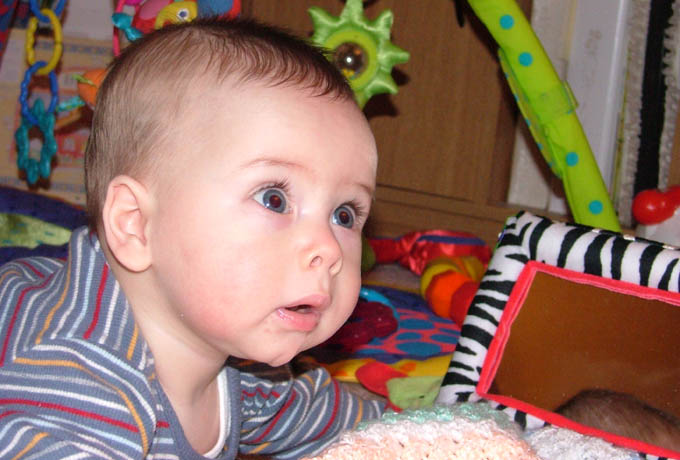We all know that children learn through play, but sometimes, despite the back flips and cartwheels we try, kids just don’t seem terribly interested in our attempts at engaging them in play.
Parenting Tips for Gross Motor Skills
Before stepping up your efforts to even more outrageous antics, make sure that all of your child’s basic needs are met. As adults, if we are hungry or tired, we’re not usually in the mood to play either. Once your child seems to be well rested, well fed, and has a clean diaper, here are some strategies to attempt:
- Children at play like to try different things. Change the type of play. If you’d been trying to engage in rough and tumble play, switch to quiet activities like books, puzzles, or blocks. If quiet activities aren’t doing the trick, try motor games like airplane flying, climbing on sofa cushions, or jumping jacks.
- When children play, it is good to engage in reciprocal interaction, like rolling a ball back and forth or building a tower of blocks for your child to then knock over.
- Deliberately establish eye contact and wait for reciprocation before initiating interactions.
- Model the appropriate way to play with a particular toy while commenting on your actions. (‘I put the circle in the hole. In. Your turn!’)
- Use hand-over-hand assistance to help your child use a toy appropriately.
- Follow your child’s lead and then build on what it shows interest in. For example, if your child’s only interested is in lining his/her cars up, line them up with him/her, and then model pushing a car along a ‘road.’
- Eliminate distractions from the environment. Some children become over-stimulated very easily. If there is a lot of noise or overly stimulating activity happening in the environment, your child may not be able to focus on the activity being presented.
- Start with just one or two simple items, and as your child is able to tolerate those, gradually add more.
Your child’s temperament plays a large role in how he or she responds to play initiations.
Some kids will always prefer to sit back and watch rather than be in the middle of the excitement. If you feel that your child is excessively passive in his or her interactions, or doesn’t seem to be motivated to interact with you or presented toys, talk to your pediatrician about your concerns. Participating with children at play can be one of the greatest joys of parenthood.
References
Case-Smith, J., Allen, A.S., and Pratt, P. (1996). Occupational Therapy for Children. St. Louis: Mosby-Year Book, Inc.
Furuno, S. (1994). Hawaii Early Learning Profile. USA: VORT Corp.

